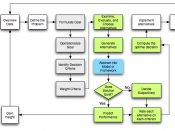"In reality organisational decision making is characterised by two opposing tendencies. On the one hand, inherent conflicts between factions, departments, units and levels and individuals over scarce resources breed conflict, opposition, careerism, negotiation, compromise. Thus conflict and competition may adversely affect problem solving and strategy formation. On the other hand, decision making may be affected not by difference and disagreement but by consensus and similarity - by the fact that decision makers share the same cognitive frames of reference and do not realise that they share these cognitive schema." Mabey et. al. (1998, p. 510).
Mabey, et. al. (1998), present a dualist view of organisational decision making which, they claim can be described in diametrically opposed dimensions of pluralist, self-serving, politicking and unitarily, group-serving, cognitive schematics. In isolation, this position appears to be a reasonable one, incorporating components of several management theories found in management literature, but like all management theories it is limited in its universal application to organisational decision making. Mabey et. al. (1998:509) comments must also be considered in context to their discussion on implementing strategic Human Resource management policy and the need to "distinguish between the realities of organisational conflicts and politics and the neat conceptual but unrealistic" strategic Human Resource management models.
Organisational decision-making; a dualist's view.
Decision making is central to organisational activity, because of its crucial role in justifying a course of action chosen from available options and to "formalise and codify management work [and] to promote communication between managers and others in the organisation" (Fulop & Lindstead 1999:298). Managers are expected to be decisive in making decisions, yet the reasons for (or ipso facto, not) making a decision are often obfuscated.
Mabey et. al. (1998:510) suggests that "conflict, opposition, careerism, negotiation, compromise" on the one hand and "consensus and similarity" on...



Good written
the essay is not very professional, but it is acceptable at all levels. I will not deny this essay if i were to use it for myself. Furthermore one thing i liked is the citation of references for this
Good Work!
0 out of 0 people found this comment useful.